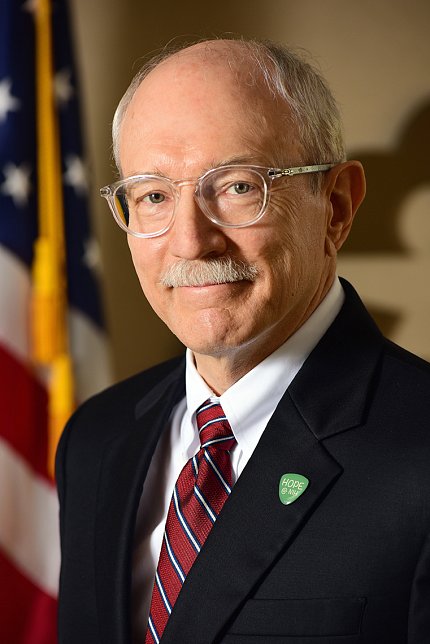New NIEHS Director Woychik To Lead with Innovation

Photo: Steve McCaw
“Innovation has been a hallmark of Rick’s scientific career and it’s at the center of his vision for leading NIEHS,” said NIH director Dr. Francis Collins, announcing the appointment. “He will be working to support new technologies and scientific approaches throughout the field of environmental health sciences—applying his proven skills in scientific excellence, creativity and rigor to improving public health.”Dr. Richard “Rick” Woychik has been named new NIEHS director. He served as acting director of the institute from October 2019 until June 7, the official start of his new role.
As NIEHS director, Woychik takes on additional responsibility as director of the National Toxicology Program (NTP), which reports directly to the Department of Health and Human Services. NTP coordinates toxicology research among NIEHS, the National Center for Toxicological Research at the Food and Drug Administration and the National Institute for Occupational Safety and Health at the Centers for Disease Control and Prevention.
Woychik is highly respected for a long list of accomplishments in environmental epigenetics and mammalian genetics. His laboratory discovered that mutations in a gene that codes for a certain protein, in a class called protocadherins, interfered with mammalian hearing. The latter gene was ultimately linked to hearing loss in Cushing’s disease patients.
Other firsts included identifying a gene associated with polycystic kidney disease, and the first cloning of an obesity-related gene called agouti.
Woychik’s passion for epigenetics and environmental health sciences is rooted in his research group’s discovery that the obesity trait associated with an agouti mutant mouse line was influenced during embryonic development by the epigenome.
Woychik said he will explore opportunities to embrace new technologies and implement state-of-the-art and potentially transformative scientific approaches for the NIEHS research enterprise.
“I am particularly interested in better integrating environmental health sciences into the All of Us Research Program and precision medicine programs at NIH,” he wrote in an email to employees.
He added that achieving insights into the molecular mechanisms involved in toxicity and other physical responses to environmental exposures will be fundamental to improving risk assessments of human health impacts.
“Individuals, with their unique biological make-up, respond to the environment in different ways,” Woychik explained. “Our current research strategies mostly employ a one-size-fits-all approach that does not factor in this critically important variable. One important element of my vision for the institute is to deal with individual genetic, epigenetic and biological variability when establishing research strategies for studying public health and environmental toxicology.”
Woychik earned his Ph.D. in molecular biology in 1984 from Case Western Reserve University. He moved into the field of molecular genetics during postdoctoral training in the lab of the late Dr. Philip Leder in Harvard Medical School’s department of genetics.
In 2010, he moved to NIEHS as deputy director, bringing basic science expertise in using genetics and epigenetics to study the influence of the environment. In nearly a decade of leadership at NIEHS, he built an in-depth awareness of and appreciation for the broad range of scientific activities—such as toxicology, epidemiology and more—that are necessary to effectively support the environmental health sciences community. That experience contributes to the wealth of knowledge he brings to his new role.
Prior to his affiliation with NIEHS, Woychik served nearly 10 years as president and CEO of the Jackson Laboratory in Bar Harbor, Maine.
